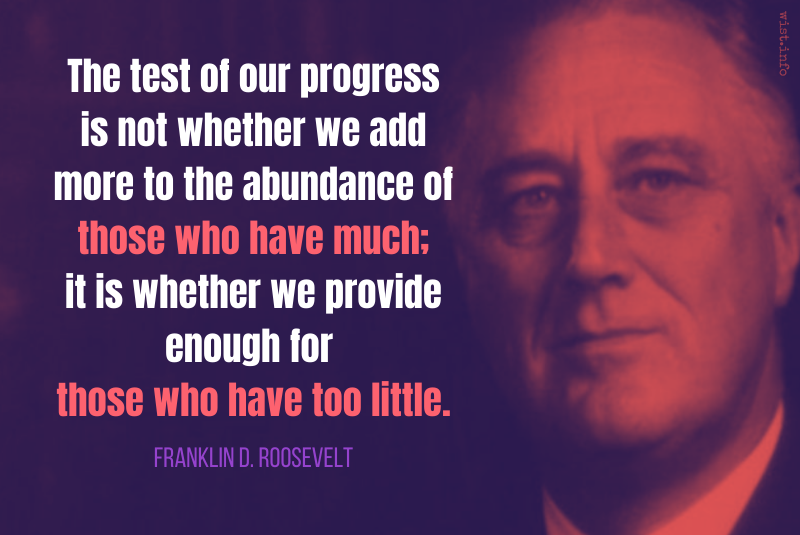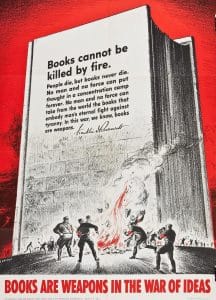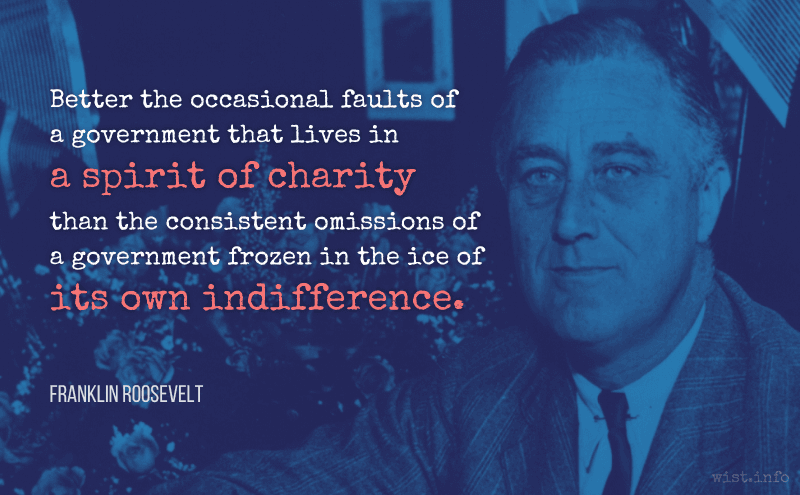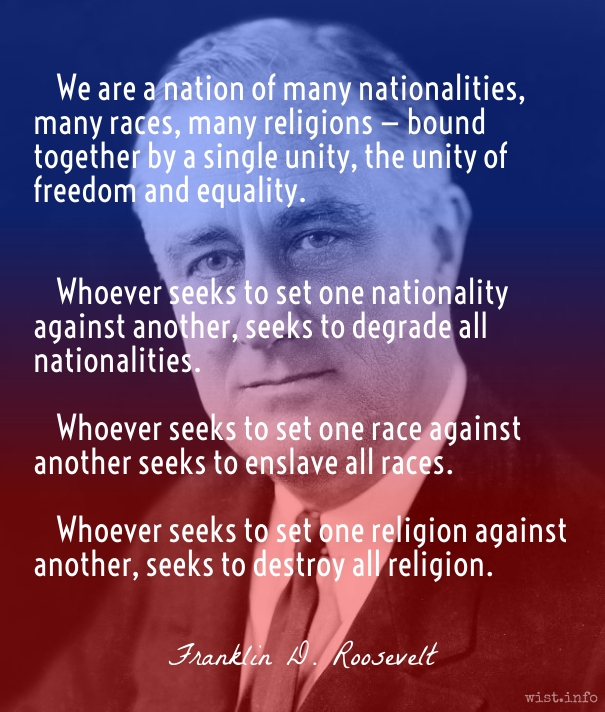Be sincere; be brief; be seated.
Franklin Delano Roosevelt (1882-1945) American lawyer, politician, statesman, US President (1933-1945)
(Attributed)
FDR's son, James, attributed this to his father, and it has frequently since been credited to him (with varying punctuation).The other day James Roosevelt opened a talk he made at Hollywood by saying: “My father gave me these hints on speechmaking. Be sincere … be brief … be seated.”
[Washington Post (1940-01-13)]
But similar sentiments elsewhere make it more likely that this is something FDR picked up and passed on. More research into this quotation (and the similar "Stand up ... speak up ... shut up") here: Quote Origin: Be Sincere; Be Brief; Be Seated – Quote Investigator®.
Quotations by:
Roosevelt, Franklin Delano
Just as our national policy in internal affairs has been based upon a decent respect for the rights and the dignity of all our fellow men within our gates, so our national policy in foreign affairs has been based on a decent respect for the rights and dignity of all nations, large and small. And the justice of morality must and will win in the end.
Franklin Delano Roosevelt (1882-1945) American lawyer, politician, statesman, US President (1933-1945)
Annual Message to Congress (6 Jan 1941)Full text.
The country needs and, unless I mistake its temper, the country demands bold, persistent experimentation It is common sense to take a method and try it: If it fails, admit it frankly and try another. But above all, try something. The millions who are in want will not stand by silently forever while the things to satisfy their needs are within easy reach.
Franklin Delano Roosevelt (1882-1945) American lawyer, politician, statesman, US President (1933-1945)
Commencement Speech, Oglethorpe U. (22 May 1932)
(Source)
A few timid people who fear progress have tried to give you new and strange names for what we are doing. Sometimes they will call it “Fascism.” Sometimes “Communism.” Sometimes “Regimentation.” Sometimes “Socialism.” But in so doing, they are trying to make very complex and theoretical something that is really very simple and very practical. I believe in practical explanations and in practical policies. I believe what we are doing today is a necessary fulfillment of what Americans have always been doing, a fulfilment of old and tested American ideals.
Franklin Delano Roosevelt (1882-1945) American lawyer, politician, statesman, US President (1933-1945)
Fireside Chat #5, “Report on Recovery” (27 Jun 1934)
The Presidency is not merely an administrative office. That’s the least of it. It is more than an engineering job, efficient or inefficient. It is pre-eminently a place of moral leadership. All our great Presidents were leaders of thought at times when certain historic ideas in the life of the nation had to be clarified.
The test of our progress is not whether we add more to the abundance of those who have much; it is whether we provide enough for those who have too little.
Franklin Delano Roosevelt (1882-1945) American lawyer, politician, statesman, US President (1933-1945)
Inaugural Address (20 Jan 1937)
(Source)
We have always known that heedless self-interest was bad morals; we know now that it is bad economics.
Franklin Delano Roosevelt (1882-1945) American lawyer, politician, statesman, US President (1933-1945)
Inaugural Address (20 Jan 1937)
(Source)
I doubt if there is in the world a single problem, whether social, political, or economic, which would not find ready solution if men and nations would rule their lives according to the plain teaching of the Sermon on the Mount.
Franklin Delano Roosevelt (1882-1945) American lawyer, politician, statesman, US President (1933-1945)
Letter (1938-06-15) to Rev. Daniel Poling, “Greeting to the World’s Christian Endeavor Convention in Melbourne, Australia”
(Source)
For it is evident that no democracy can long survive which does not accept as fundamental to its very existence the recognition of the rights of its minorities.
Franklin Delano Roosevelt (1882-1945) American lawyer, politician, statesman, US President (1933-1945)
Letter (1938-06-25) to Walter White, “Greeting to the NAACP,” NAACP Annual Conference, Columbus, Ohio
(Source)
We all know that books burn — yet we have the greater knowledge that books cannot be killed by fire. People die, but books never die. No man and no force can abolish memory. No man and no force can put thought in a concentration camp forever. No man and no force can take from the world the ideas that embody man’s eternal fight against tyranny of every kind. In this war, we know, books are weapons.
Franklin Delano Roosevelt (1882-1945) American lawyer, politician, statesman, US President (1933-1945)
Letter (1942-04-23), “Message to American Booksellers Association,” Annual Banquet (1942-05-06), Astor Hotel, New York City
(Source)
The letter was delivered with a speech by Archibald MacLeish (appointed by Roosevelt as Librarian of Congress, 1939-1944) titled "A Free Man's Books." This was shortly after FDR named April 17 as "Victory Book Day".
This quotation was turned into a poster by S. Broder, published by the US Office of War Information in 1942.
There is no question in my mind that it is time for the country to become fairly radical for a generation. History shows that where this occurs occasionally, nations are saved from revolution.
We must scrupulously guard the civil rights and civil liberties of all citizens, whatever their background. We must remember that any oppression, any injustice, any hatred, is a wedge designed to attack our civilization.
Franklin Delano Roosevelt (1882-1945) American lawyer, politician, statesman, US President (1933-1945)
Letter to William Allan Neilson (1940-01-09)
(Source)
Neilson was the co-chair of the Sponsor Committee, Fourth Annual Conference of the American Committee for Protection of Foreign-Born. It was read to the conference on 1 March 1940, and entered into the Congressional Record (along with other letters received) on 11 March.
About two years later, 19 February 1942, FDR signed Executive Order 9066, authorizing the evacuation of all persons (which largely meant Japanese-Americans) deemed a national security threat from the West Coast to internment centers further inland.
The liberty of a democracy is not safe if the people tolerate the growth of private power to a point where it becomes stronger than their democratic State itself. That, in its essence, is Fascism — ownership of government by an individual, by a group or by any controlling private power.
I pledge you, I pledge myself, to a new deal for the American people. Let us all here assembled constitute ourselves prophets of a new order of competence and of courage. This is more than a political campaign; it is a call to arms. Give me your help, not to win votes alone, but to win in this crusade to restore America to its own people.
A Conservative is a man with two perfectly good legs who, however, has never learned to walk forward.
Franklin Delano Roosevelt (1882-1945) American lawyer, politician, statesman, US President (1933-1945)
Radio Address, New York Herald Tribune Forum (26 Oct 1939)
(Source)
When peace has been broken anywhere, the peace of countries everywhere is in danger.
Franklin Delano Roosevelt (1882-1945) American lawyer, politician, statesman, US President (1933-1945)
Radio Broadcast (1939-09-03) “Fireside Chat”
(Source)
The experience of the past two years has proven beyond doubt that no nation can appease the Nazis. No man can tame a tiger into a kitten by stroking it. There can be no appeasement with ruthlessness. There can be no reasoning with an incendiary bomb. We know now that a nation can have peace with the Nazis only at the price of total surrender.
Franklin Delano Roosevelt (1882-1945) American lawyer, politician, statesman, US President (1933-1945)
Radio Broadcast (1940-12-29), “Fireside Chat: Arsenal of Democracy”
(Source)
So, first of all, let me assert my firm belief that the only thing we have to fear is fear itself — nameless, unreasoning, unjustified terror which paralyzes needed efforts to convert retreat into advance.
Governments can err, presidents do make mistakes, but the immortal Dante tells us that Divine justice weighs the sins of the cold-blooded and the sins of the warm-hearted on different scales. Better the occasional faults of a government that lives in a spirit of charity than the consistent omissions of a government frozen in the ice of its own indifference.
Franklin Delano Roosevelt (1882-1945) American lawyer, politician, statesman, US President (1933-1945)
Speech (1936-06-27), Acceptance, Renomination for President, Democratic National Convention, Philadelphia
(Source)
(Source (Audio), 10:40)
The royalists of the economic order have conceded that political freedom was the business of the government, but they have maintained that economic slavery was nobody’s business. They granted that the government could protect the citizen in his right to vote, but they denied that the government could do anything to protect the citizen in his right to work and his right to live.
Today we stand committed to the proposition that freedom is no half-and-half affair. If the average citizen is guaranteed equal opportunity in the polling place, he must have equal opportunity in the market place.Franklin Delano Roosevelt (1882-1945) American lawyer, politician, statesman, US President (1933-1945)
Speech (1936-06-27), Acceptance, Renomination for President, Democratic National Convention, Philadelphia
(Source)
(Source (Audio): 7:08)
These economic royalists complain that we seek to overthrow the institutions of America. What they really complain of is that we seek to take away their power. Our allegiance to American institutions requires the overthrow of this kind of power. In vain they seek to hide behind the flag and the Constitution. In their blindness they forget what the flag and the Constitution stand for. Now, as always, they stand for democracy, not tyranny; for freedom, not subjection; and against a dictatorship by mob rule and the over-privileged alike.
Franklin Delano Roosevelt (1882-1945) American lawyer, politician, statesman, US President (1933-1945)
Speech (1936-06-27), Renomination Acceptance, Democratic National Convention, Philadelphia
(Source)
I believe in individualism. I believe in it in the arts, the sciences and professions. I believe in it in business. I believe in individualism in all of these things — up to the point where the individualist starts to operate at the expense of society.
If the fires of freedom and civil liberties burn low in other lands, they must be made brighter in our own.
If in other lands the press and books and literature of all kinds are censored, we must redouble our efforts here to keep them free.
If in other lands the eternal truths of the past are threatened by intolerance we must provide a safe place for their perpetuation.Franklin Delano Roosevelt (1882-1945) American lawyer, politician, statesman, US President (1933-1945)
Speech (1938-06-30), National Education Association, World’s Fair, New York City
(Source)
But the future lies with those wise political leaders who realize that the great public is interested more in Government than in politics.
Franklin Delano Roosevelt (1882-1945) American lawyer, politician, statesman, US President (1933-1945)
Speech (1940-01-08), Jackson Day Dinner, Mayflower Hotel, Washington, D. C.
(Source)
Quoted by Ronald Reagan, State of the Union (1983-01-25), though he appeared to misattribute the phrase to Roosevelt's second State of the Union message.
Since the beginning of our American history, we have been engaged in change — in a perpetual peaceful revolution — a revolution which goes on steadily, quietly adjusting itself to changing conditions — without the concentration camp or the quick-lime in the ditch.
Franklin Delano Roosevelt (1882-1945) American lawyer, politician, statesman, US President (1933-1945)
Speech (1941-01-06), “State of the Union [Four Freedoms Speech],” Washington, D. C.
(Source)
The only limit to our realization of tomorrow will be our doubts of today.
Franklin Delano Roosevelt (1882-1945) American lawyer, politician, statesman, US President (1933-1945)
Speech (Undelivered) for Jefferson Day (13 Apr 1945)
(Source)
We are a nation of many nationalities, many races, many religions — bound together by a single unity, the unity of freedom and equality. Whoever seeks to set one nationality against another, seeks to degrade all nationalities. Whoever seeks to set one race against another seeks to enslave all races. Whoever seeks to set one religion against another, seeks to destroy all religion.
I have seen war. I have seen war on land and sea. I have seen blood running from the wounded. I have seen men coughing out their gassed lungs. I have seen the dead in the mud. I have seen cities destroyed. I have seen 200 limping, exhausted men come out of line — the survivors of a regiment of 1,000 that went forward 48 hours before. I have seen children starving. I have seen the agony of mothers and wives. I hate war. I have passed unnumbered hours, I shall pass unnumbered hours thinking and planning how war may be kept from this nation.
Franklin Delano Roosevelt (1882-1945) American lawyer, politician, statesman, US President (1933-1945)
Speech, Chautauqua, New York (1936)
Full text. FDR, as Assistant Secretary of the Navy, visited the front lines of WWI in France after American troops were in service.
We had to struggle with the old enemies of peace — business and financial monopoly, speculation, reckless banking, class antagonism, sectionalism, war profiteering. They had begun to consider the Government of the United States as a mere appendage to their own affairs. We know now that Government by organized money is just as dangerous as Government by organized mob. Never before in all our history have these forces been so united against one candidate as they stand today. They are unanimous in their hate for me — and I welcome their hatred.
Franklin Delano Roosevelt (1882-1945) American lawyer, politician, statesman, US President (1933-1945)
Speech, Madison Square Garden, New York City (31 Oct 1936)
Full text.
Let us not be afraid to help each other — let us never forget that government is ourselves and not an alien power over us. The ultimate rulers of our democracy are not a President and Senators and Congressmen and Government officials but the voters of this country.
Franklin Delano Roosevelt (1882-1945) American lawyer, politician, statesman, US President (1933-1945)
Speech, Marietta, Ohio (8 Jul 1938)
(Source)
An American Government cannot permit Americans to starve.
Franklin Delano Roosevelt (1882-1945) American lawyer, politician, statesman, US President (1933-1945)
Speech, San Diego Exposition (2 Oct 1935)
(Source)
Perfectionism, no less than isolationism or imperialism or power politics, may obstruct the paths to international peace. Let us not forget that the retreat to isolationism a quarter of a century ago was started not by a direct attack against international cooperation but against the alleged imperfections of the peace.





